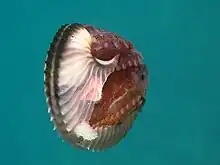nautilus
See also: Nautilus
English

Nautilus
Etymology
From Latin nautilus, from Ancient Greek ναυτίλος (nautílos, “paper nautilus, sailor”).
Pronunciation
- (Received Pronunciation) IPA(key): /ˈnɔː.tɪ.ləs/
- (General American) IPA(key): /ˈnɔ.tɪ.ləs/, /ˈnɑ.tɪ.ləs/
Audio (US) (file)
Noun
nautilus (plural nautiluses or nautili)
- A marine mollusc, of the family Nautilidae native to the Pacific Ocean and Indian Ocean, which has tentacles and a spiral shell with a series of air-filled chambers, of which Nautilus is the type genus.
- 1956, Arthur C. Clarke, The City and the Stars, page 44:
- He was still prepared to go on collecting all that life could offer, like a chambered nautilus patiently adding new cells to its slowly expanding spiral.
- A kind of diving bell that sinks or rises by means of compressed air.
Synonyms
Derived terms
Translations
marine mollusc of the family Nautilidae
|
References
 Nautilidae on Wikispecies.Wikispecies
Nautilidae on Wikispecies.Wikispecies
Latin

nautilus (paper nautilus)
Alternative forms
Etymology
From Ancient Greek ναυτίλος (nautílos, “nautilus, sailor”); see naval.
Pronunciation
- (Classical) IPA(key): /ˈnau̯.ti.lus/, [ˈnäu̯t̪ɪɫ̪ʊs̠]
- (modern Italianate Ecclesiastical) IPA(key): /ˈnau̯.ti.lus/, [ˈnäːu̯t̪ilus]
Declension
Second-declension noun.
| Case | Singular | Plural |
|---|---|---|
| Nominative | nautilus | nautilī |
| Genitive | nautilī | nautilōrum |
| Dative | nautilō | nautilīs |
| Accusative | nautilum | nautilōs |
| Ablative | nautilō | nautilīs |
| Vocative | nautile | nautilī |
Related terms
Descendants
References
- “nautilus”, in Charlton T. Lewis and Charles Short (1879) A Latin Dictionary, Oxford: Clarendon Press
- nautilus in Gaffiot, Félix (1934) Dictionnaire illustré latin-français, Hachette.
Romanian
Declension
Declension of nautilus
This article is issued from Wiktionary. The text is licensed under Creative Commons - Attribution - Sharealike. Additional terms may apply for the media files.